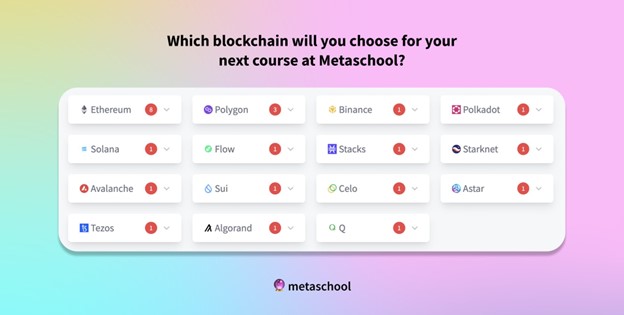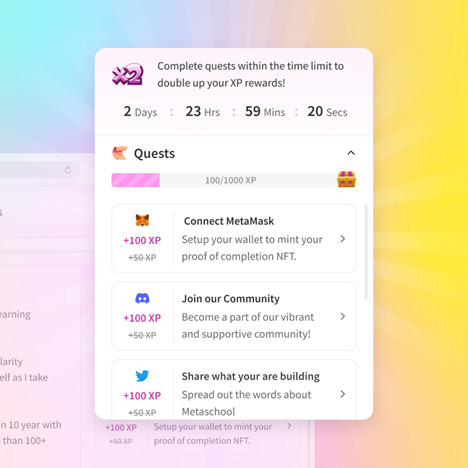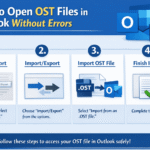How Metaschool is revolutionizing the Web3 ed-tech scene
The term Web3, coined by Gavin Wood, back in 2014 has become a buzzword today. It includes blockchain, decentralization, NFTs, smart contracts, and cryptocurrency under its umbrella. Over the last 2-3 years, founders and people in leadership positions in tech companies have started to realize the sheer importance of Web3 in various sectors and industries such as healthcare and supply chain.
The education sector is also no exception. Today, the ed-tech industry has grown to great heights. In the US alone, the industry had a combined valuation of $23 billion in 2021. Recently, many have come to believe that the inclusion of Web3 and blockchain technology in ed-tech can make online learning more accessible, efficient, affordable, and dynamic.
But what about Web3 education itself? How are we creating more experts in the field? Well, there are a number of prominent Web3 ed-tech startups that are creating courses, conducting webinars, and weaving close-knit communities that can further promote Web3. However, one such platform stands out from the rest.
With over 25 free Web3 courses across 13 different blockchains in just under 1.5 years, Metaschool is catering to developers who aim to switch from Web2 and make it big in Web3. But how is this young startup that started off from zero demonstrating such feats?
5 reasons why Metaschool is not an average Web3 platform

Although there are a number of parameters that show that Metaschool is truly thriving and is in fact, is very close to educating a million Web3 enthusiasts, there are some very critical reasons that show that the platform is also a unique one in its own way.
Gamified Learning
Metaschool believes in using a blend of data and marketing to attract people to the platform as there is still a huge number of people who are apprehensive about getting into blockchain. In quest of finding ways to provide maximum value through the courses, Metaschool learned the importance of gamification. In fact, an important reason why Web3 gained significant prominence is because of gamers who drew massive growth to the ecosystem.
Moreover, as per data, active learners, in a gamified environment, can retain up to 93.5% of the knowledge compared to 79% for passive learners. However, not many Web3 education platforms today are leveraging that.
Metaschool took the big step by revamping the whole platform and completely gamifying it to take user experience and learning experience to the moon. Today, each course and each module of a course on Metaschool is like a quest with hundreds of experience points (XPs) associated with it.

When a user successfully completes a course, they earn XPs and also receive a streak rate based on how consistently they use the platform. The streak rate and XPs then combine to get you on the Metaschool leaderboard for platform-wide recognition, earning you NFTs and other rewards.
With gamification, the Metaschool courses are fun and easier to learn. Evidence of this is the fact that just 3 days after introducing the gamification feature, over 40,000 developers earned 16 billion XPs with multiple reviews about the skyrocketing improvement in the overall platform experience.
Affordability
Every Tom, Dick and Harry today is hell-bent on selling their courses. This has created a huge disparity in learning because other than YouTube (which has also been hijacked by advertisements now), there are not many platforms that only aim to educate. Moreover, Web3 is relatively new and people have their own set of doubts.
Metaschool noticed this problem very early on. As a result, most of the courses available on the platform are free of cost. Moreover, the best thing about the available courses is that they are both basic and advanced. From teaching you what Solidity is and how you can use a MetaMask account to enabling you to create a dApp, Meta school has got everything that anyone interested in Web3 needs.
Decentralization
Learning today is being divided into two forms – centralized and decentralized. Centralized learning has been seen to face multiple challenges from consumers in the light of data leaks, lack of transparency, unaffordability, and much more. Decentralized learning has emerged as the next big thing, serving as a competitor and an antidote to the bad in centralization.
Metaschool also promotes decentralized education. For example, as a new user, you are only required to input your email and the OTP code to sign up to enroll in a Metaschool course. Once you sign up, you can take as many courses as you want.
Apart from only requiring your email address, Metaschool also has a decentralized data-keeping and record-keeping system that keeps track of your course progress and provides you with an NFT on the successful completion of each course.
Community
One of the main reasons why the Web3 space has yet not bowed down to Web2, despite numerous ups and downs, is because of the strong community that it has fostered. Community is the main USP of the ecosystem.
The Metaschool users have also established a people network across different social media websites including Discord, Twitter, and LinkedIn. It mostly comprises Metaschool’s users who have cultivated an environment of learning, supporting, and uplifting fellow blockchain developers by guiding them and enabling their Web3 journeys. When you become a part of Metaschool, you get to be included in the vibrant virtual community and further upskill yourself.

Special Program for Young Web3 Devs
Some time back, Metaschool observed that many high school and college students are interested in pursuing a career in Web3 because of the field’s potential for innovation and also because it mostly comprises young people.
To facilitate the young blood and ensure that they have a thriving Web3 ahead of them while serving as spokespersons for the startup, Metaschool launched its much-anticipated program known as the Metaschool Nodes Program. Season 1 of the Program was a great success. The applications for Season 2 are open.
Conclusion
In conclusion, Metaschool is a very consumer-centric Web3 ed-tech platform whose sole aim is to further the ecosystem and take it to greater heights. Most of the courses available on the platform are free of cost, there’s a strong community, and the learning is completely gamified for better knowledge retention and improved user experience. It is also one of the few platforms that has seen massive growth in less than 2 years with over 130K developers and an overall rating of 4.5 stars.
Bio: Sara Illahi Panhwer is an Associate Content Creator at Metaschool, a Singapore-based Web ed-tech startup. She can be reached at: sara.illahi@metaschool.so

















